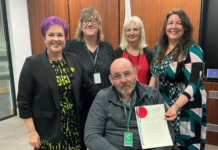Reducing hospital admissions, improved support for patients to go home after being treated and more staff are among the measures being put in place to prepare for winter, NHS Wales chief executive Andrew Goodall announced today.
Dr Andrew Goodall has outlined how health boards, NHS trusts, the Welsh Ambulance Service and councils have worked together to develop integrated winter plans, which are designed to ensure they have the right planning arrangements in place in to prepare for winter, particularly during peaks in pressure.
The draft plans were published in September and now staff across the NHS are implementing them. Ministers are investing £20m a year in the successful Intermediate Care Fund, which supports schemes which improve out-of-hospital care and help people return home from hospital.
NHS Wales is also calling on people to play their part to help the NHS and people with life-threatening conditions this winter by choosing the right health service for their needs as part of their national Choose Well campaign, which encourages people to think about how they use their NHS and find the right health service for their illness or injury.
Between 70% and 80% of people who attended accident and emergency departments in Wales in 2014-15 were not admitted for ongoing treatment. Many could have been seen, assessed and received advice more appropriately and, in many cases more quickly, in another healthcare setting, such as a minor injuries unit, GP surgery or a pharmacy.
Measures in the winter plans include:
- Identifying extra beds in response to an increase in demand, while at the same time each reducing occupancy by avoiding admissions, reducing lengths of stay and supporting discharges
- Reducing hospital admissions by increasing the use of minor injury units, working with GP out of hours services for patients
- Enhanced support for people at home or to help their discharge from hospital at the earliest opportunity
- Reducing the length of stay for patients by increased consultant cover, fewer delayed transfers of care, improved patient transport arrangements and increased use of discharge lounges
- Identifying times when the service can expect surges in demand, extending working hours to include weekends and evenings
- Increasing seven-day working strengthened senior management and clinical presence, including therapists and social workers, to ensure all key services remain open through the Christmas and New Year period
- Working with social care teams to speed up the discharge of patients, including services which help patients return to their normal lives (known as reablement)
- Some health boards have recruited extra staff to meet the needs of patients over the winter period.
Dr Goodall said:
“The health service maintains and reviews plans constantly throughout the year but we all know winter can bring additional pressures.
“That’s why organisations across the Welsh NHS have been working together to prepare for this winter. Our health boards, councils and the ambulance service have developed integrated winter plans to prepare for winter, particularly during peaks in pressure.
“The dedication of our staff will be on display once again as they pull together to meet the needs of the thousands of patients treated in our health service every day.
“While NHS staff play their part, every one of us can also help with pressures this winter by choosing the right health service for any illness or injury. The vast majority of medical conditions do not need emergency care.
“Our A&E departments see a million people a year. However, self care is the best option for treating the minor illnesses and injuries which can make up a significant proportion of what healthcare workers deal with. Many illnesses can be treated in your home with over-the-counter medicines and plenty of rest.
“When your injury or illness can’t be managed at home, your GP practice, NHS Direct Wales, local pharmacy, optician or dentist can help. A&E is for serious, life-threatening conditions that need immediate medical attention.”
Help keep news FREE for our readers
Supporting your local community newspaper/online news outlet is crucial now more than ever. If you believe in independent journalism, then consider making a valuable contribution by making a one-time or monthly donation. We operate in rural areas where providing unbiased news can be challenging. Read More About Supporting The West Wales Chronicle























